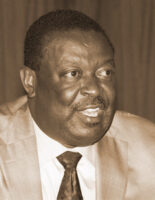
Wycliffe Musalia Mudavadi joined politics in 1989 after the death of his father, Moses Mudavadi. He won the parliamentary seat vacated by his father, becoming the Member of Parliament for Sabatia Constituency.
He is credited with saving the country from runaway inflation and resumption of aid when he became Minister for Finance after the 1992 multiparty elections. Mudavadi was the seventh and last Vice President of Kenya – appointed three months before the 2002 General Election after Vice President George Saitoti left KANU for the Opposition.
Within KANU the soft-spoken politician came across as more refined and youthful than the older members of the party. He preferred to concentrate on his Cabinet docket and rarely held public rallies like his party colleagues.
As soon as Mudavadi won the by-election, Moi appointed him Minister for Marketing, making him the youngest Kenyan ever to join the Cabinet. He introduced reforms in cereals procurement and marketing, and the National Cereals and Produce Board (NCPB) was reformed to accept maize only from Kenyan farmers, cutting out cartels that used to import the commodity and “dump it” on NCPB.
He became Kenya’s fifth Minister for Finance after the 1992 General Election and moved to the Ministry of Agriculture after the 1997 elections. From there he was transferred to Transport and then named Vice President. Mudavadi’s performance in all the ministries gave him national appeal and the experience required to run Government.
When he took over the Finance docket in 1993, the economy was in tatters. There was excess money circulating in the country and the Government had borrowed too much from the local market. The Government had also printed money to use for the election campaigns the previous year, causing hyperinflation. The prices of food and other essential commodities skyrocketed.
The country did not have enough money left for individual and business borrowing, precipitating a sharp rise in bank interest rates – as high as 45 per cent in some banks. Mudavadi admitted to Parliament that the Government had printed more money than the country needed during the 1992 elections. The Opposition praised him for his boldness.
At Treasury, the Minister began to mop up the currency in circulation. This move won him admiration from the Opposition and the international community. His work was made easier by the appointment of Micah Cheserem, a no-nonsense technocrat, as Governor of the Central Bank of Kenya.
Mudavadi oversaw privatisation of local State corporations, won back donor confidence to resume foreign aid and established a strong banking industry. He also resisted pressure to honour payments for contracts the Government had signed. He received support for this move from Cheserem and from a former Cabinet colleague, Simeon Nyachae, who argued the Government would collapse if that money was paid.
Things came to a head when the Public Accounts Committee, under the chairmanship of Forum for the Restoration of Democracy (FORD)-Kenya leader Michael Wamalwa, presented a report to Parliament in 1995 recommending that a contract for export compensation for diamonds and gold — filed by Kamlesh Pattni on behalf of Goldenberg International — be paid since it had been approved by Parliament. The claim was for KES 1.2 billion, a monumental sum that would have effectively crippled the budget.

Mudavadi successfully lobbied for support from MPs to oppose payment and to vote to delete the paragraph from the report, thereby saving the Government.
During his time in Agriculture he faced challenges from the ailing sugar industry over illegal imports, late payments for milk and cereals produce, and delayed bonus payments for coffee and tea farmers. He tackled these issues with help from the ministry’s Permanent Secretary, Shem Migot Adhola, who was part of the so-called ‘dream team’ that had been formed to repair the economy. They got off to a good start in dealing with the problems but did not manage to complete the task before they left the ministry.
In 1998 the President named the Cabinet but made the job of Leader of Government Business in Parliament, traditionally occupied by the Vice President, rotational. Mudavadi was the first to be appointed to the position in 2002. Although his time as VP was too short for him to leave a mark, two notable things happened during his tenure.
First, soon after his appointment there was a terrorist attack at a hotel in Kikambala on the Kenyan coast. Mudavadi promptly travelled to the area to assess the situation.
Second, Ugenya MP James Orengo moved a motion of no-confidence against the Government. He enumerated several alleged corrupt dealings within the Government. Orengo summarised his motion by saying that a corrupt government did not deserve to be in office.
Mudavadi defended the Government, saying there was no evidence of the claims and that it was unfair to subject Kenyans to another election. He successfully lobbied MPs to vote against the motion.
Mudavadi was born in 1961 and attended high school at the Nairobi School. He was a Member of Parliament under Moi from 1989 to 2002, the year he lost the Sabatia seat to Moses Akaranga. He stayed out of Parliament until 2007. He was Deputy Prime Minister and Minister for Local Government under the Mwai Kibaki-Raila Odinga coalition government from 2008 to 2012, the year he ran for President.
